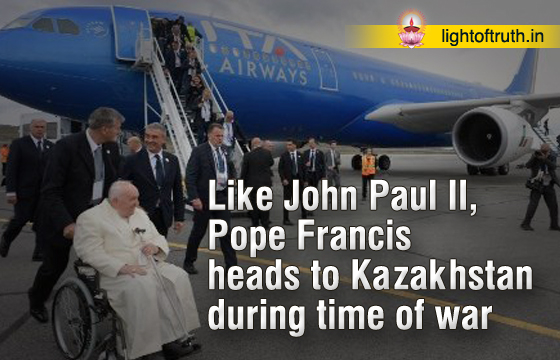Azadi ka Amrit Mahotsav Kolkata event honours four Clergymen
Pope Francis asks businesses to support working women: They’re ‘afraid to get pregnant’
Study: Christianity may lose majority, plurality status in U.S. by 2070
Indian politician declines Magsaysay Award under party pressure
Like John Paul II, Pope Francis heads to Kazakhstan during time of war

Popes seem to have a habit of visiting Kazakhstan amid major crises and conflicts that risk fracturing regional stability and splintering its diverse religious and ethnic communities, and Pope Francis’s visit this week is no exception.
When Pope John Paul II visited Kazakhstan in 2001, it was just 10 years after the country gained independence amid the dissolution of the Soviet Union, and roughly 10 days after the Sept. 11 terrorist attacks in the United States that levelled the Twin Towers and claimed thousands of American lives.
Shortly after, U.S. President George W. Bush declared his global War on Terror, which John Paul II had tried to prevent, and which heightened the prospect of a further escalation of geopolitical and interfaith tensions.
At the time, Kazakh citizens were still grappling with how to craft a new society in the post-Soviet era and tensions with Islam were at an all-time high in the majority-Muslim nation, where Christians are a small minority.
In his speeches and homilies throughout the visit, John Paul II offered encouragement to those still disillusioned by the breakup of the Soviet Union, and he also sent a clear message of tolerance, praising the central Asian nation as a place of harmony where different religious confessions were able to work together in building a world without violence.
Two years later, in 2003, the first Congress of Leaders of World and Traditional Religions was launched by former President Nursultan Abishuly Nazarbayev – a Soviet and Kazakh politician who served as first president of Kazakhstan from its independence in 1991 until his formal resignation in 2019 – in an effort to foster stronger ties among Kazakhstan’s different religious communities and to shed light on the unique inter-religious history of the country. Pope Francis, who is poised to arrive in Kazakhstan on September 13 for the seventh edition of the congress, finds himself in a similar situation of regional instability and uncertainty, as the country is in many ways caught in the middle of the Ukraine-Russia war, the region’s most violent conflict since the World War II.The war, which erupted after Russia’s Feb. 24 invasion of Ukraine, has so far caused around 12 million people to flee their homes and has claimed thousands of civilian lives, including those of children.
Leave a Comment